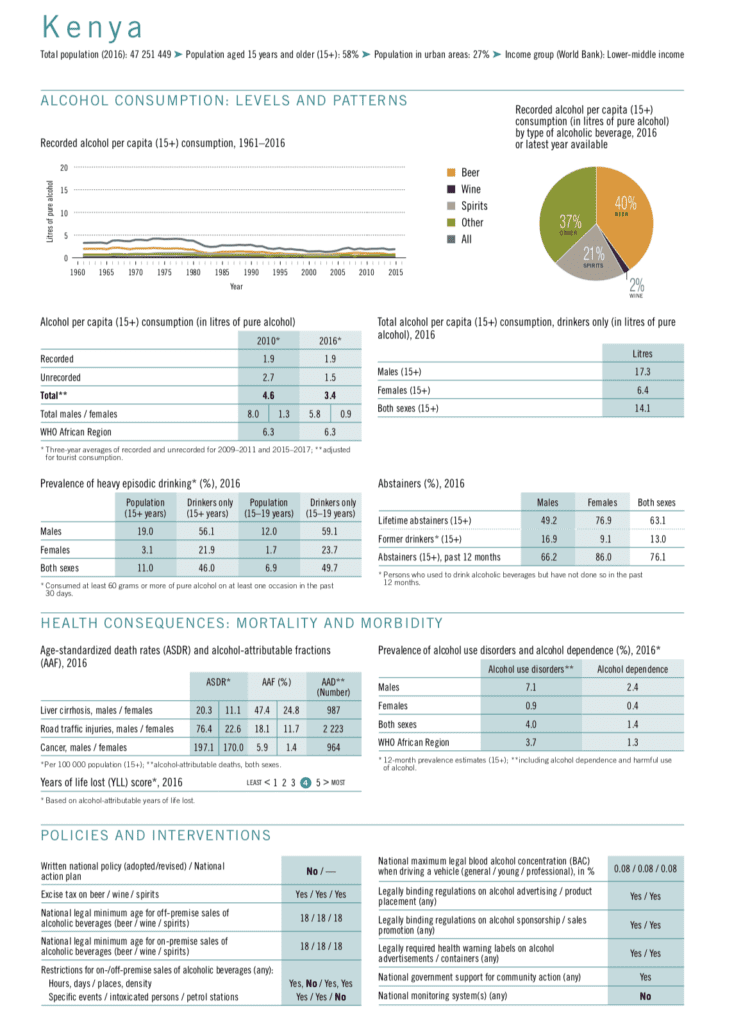Kenya: Home Delivery Fuels Alcohol Harm
During the COVID-19 pandemic, online alcohol sale and home delivery is increasingly fueling alcohol harm in Kenya.
One of the damages of the COVID-19 lockdown – and fueled by Big Alcohol – is the normalization of consuming alcohol at home. In Kenya people have turned to alcohol to “pass time” and have started to use it to “cope” with the stresses of the pandemic and being in isolation. This is aggravated by the easy availability of alcohol through online retail and home delivery.
The World Health Organization (WHO) has specifically advised people to avoid alcohol because alcohol can weaken the immune system and increase susceptibility to the novel coronavirus and its complications. The WHO has also stressed that alcohol is not a healthy coping tool and suggested other healthy coping mechanisms such as calling loved ones and seeking support.
Despite advise of public health experts, Big Alcohol is boosting their sales in Kenya. London Distillers and East Africa Breweries Ltd (EABL), for instance, have come up with dial-a-delivery services, where they market their products on social media, complete with a contact and bundling offers. People can have beer, wine and whisky delivered to their homes in a matter of minutes.
One distributor has said that demand for products has increased by almost 100% due to the new online and delivery services.
Pervasive alcohol harm in Kenya
This is specially concerning considering the existing heavy alcohol burden in Kenya.
The WHO Global Alcohol Status Report from 2018 details the harm alcohol causes to people and communities in Kenya. It shows that 76% of the adult population abstains from any alcohol use. And yet, Kenya ranks among the top countries worldwide for years of life lost due to alcohol.
- More than 2000 road traffic deaths are due to alcohol, each year.
Alcohol use among consumers is worryingly high, with Kenyan males consuming 17 liters per capita per year. And heavy episodic alcohol use is staggering, with every second minor who consumes alcohol engaging in binge alcohol use.
- Data shows alcohol use prevalence among primary school pupils is at 38.2%.
- Alcohol addiction is prevalent across the country with Nairobi having the highest prevalence of alcohol addiction with 18.4%.
- 7% of Kenyan men have an alcohol use disorder.
- In December 2018, NACADA released a report showing 60% men who are married of cohabiting are heavy alcohol users.
The National Authority for the Campaign Against Alcohol and Drug Abuse (NACADA) is a Semi-Autonomous State Corporation under the Ministry of Interior and Coordination of the National Government.
Lasting consequences from high alcohol consumption during COVID-19
Early on myths about alcohol killing the novel coronavirus led to people consuming large amounts of alcohol and even deaths such as the case in Iran. Kenya has also been affected by such myths.
Movendi International addressed these myths and shed light on how alcohol weakens the immune system making people more susceptible to the virus and its complications.
Alcohol consumption during the current pandemic increases the burden on countries because:
- Alcohol harms the physical and mental health of people,
- Alcohol weakens the immune system,
- Alcohol causes road traffic accidents, injury and death due to driving under the influence,
- Alcohol fuels addictions,
- Alcohol fuels violence such as domestic violence and gender-based violence, and
- Alcohol increases the already heavy burden on healthcare systems, emergency services and law enforcement due to alcohol health harms and violence.
The WHO has issued recommendations for countries to limit access to alcohol during this public health crisis, to strengthen alcohol policy measures and not weaken or undermine existing alcohol laws.
But the Kenyan government, under the influence of Big Alcohol, decided to ignore WHO advice and declared alcohol and tobacco “essential”. It is becoming clear, that this has been a serious mistake that people in Kenya are paying a high price for.
Already in July 2019 it became apparent that alcohol was a serious threat to President Kenyatta’s “Big 4 Flagship Initiative”. The initiative aims at advancing sustainable development in Kenya through bold action across four priority areas: manufacturing, universal healthcare coverage, affordable housing and food security.
Alcohol and the COVID-19 pandemic are now forming a perfect storm putting these four development priorities further out of reach.
Easy and increased alcohol availability through the “essential” status and the new home delivery push from Big Alcohol is driving alcohol consumption. In turn, this will have lasting effects on long-term alcohol harm even after the pandemic threat subsides. Health experts predict the lockdown and physical distancing measures to curb the spread of the virus will have long-term mental health consequences specifically with addictions, stress, anxiety and depression.
Dr Lukoye Atwoli, an associate professor of psychiatry at Moi University, says that more people are susceptible to substance use disorders at times of isolation like now, and are exposed to use it in a harmful way.
Drug prevention agency NACADA, has started several advocacy campaigns in the media to “help people know that alcohol is not essential and they can do without it”.
